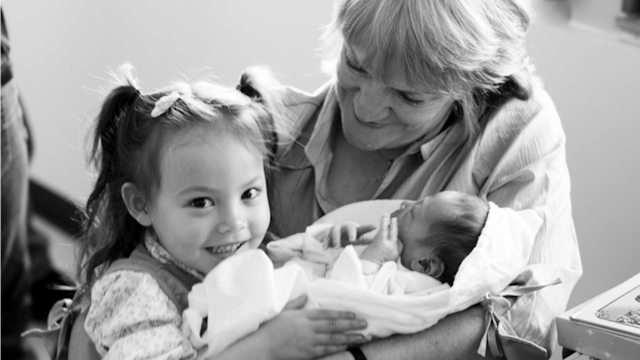Get These Shots, Or Stay Away From Newborns

Before I had kids, if I saw someone freak out about germs, I would think, “Geez, that person needs to chillax. Germs are fine. Getting sick is no big deal.”
Then I had kids, and I turned into a bonafide germaphobe. What used to be an annoying cold for me could turn into a month-long-snot-and-cough-a-thon for my kids. And when my son started to develop terrifying asthma symptoms with his respiratory infections, I did everything in my power keep him healthy and virus-free.
The fact is, little kids are much more susceptible to viruses and diseases than most grown-ups. That is especially true for newborns, whose immune systems are basically non-existent, whose bodies are tiny and vulnerable, and who can’t receive any vaccinations until they are about two months old.
So listen up, moms and dads. You know those early days and weeks when you are inundated with a ton of visitors who want to ohhhhhh and awwwww all over your baby? And you’re like, “OMG, please don’t come over if you have a cold or are just getting over the plague.” But then you’re a little too polite to say something?
Well, I’m going to give you permission to say something, and I’m going to give you permission to turn anyone away who is sick – including people who show up at your door with as much as a sniffle.
And then, I’m going to even go a step further, and suggest that you make sure your guests have received vaccinations against the most common viruses that could make your wee one really sick.
Wait, you might say, isn’t asking my visitors if they’ve been vaccinated kind of taking things a bit too far? Isn’t that an invasion of their privacy?
Nope, it’s not. And here’s why: If your guests aren’t vaccinated, they are more likely to infect your baby with a very serious, potentially life-threatening virus. And if that happens, then yes, their vaccination status is very much your business.
And guess what? You’re not saying that they must be vaccinated according to your specifications, only that they can’t freaking come near your newborn if they aren’t.
Don’t just take it from me. As the CDC explains, new parents should work to create a “circle of protection” around their vulnerable newborn, and that includes making sure that everyone who comes into contact with their baby (grandparents, caregivers, friends) be up to date on their vaccines – in particular the flu shot and whooping cough (pertussis) vaccines.
Why these two shots?
Let’s start with the flu shot. We know that although flu shots do not offer 100% protection against getting the flu, they do offer some important protection, and they are the best we have right now. Furthermore, babies less than 6 months can’t get flu shots, so that’s why everyone around them needs to be protected.
Most importantly, if your baby were to get the flu, it could be extremely dangerous. As Dr. Flor M. Munoz tells Real Simple, babies and young kids are more likely to develop serious complications like pneumonia from the flu.
“Children under age 5 and adults over age 65 are the groups most at risk of being hospitalized or dying from the flu,” Dr. Munoz explains. “Babies don’t have a mature immune system yet—they’re still figuring out how to fight infection. Their little lungs are still developing, they get more inflammation, and it takes longer for them to recover.”
The same line of thinking goes for whooping cough (which has sadly become more and more prevalent over the past few years). Infants can’t get this shot until they are 2 months old, and if they contract the virus, they are especially at risk for life-threatening symptoms.
Dr. Munoz concurs, and warns that whooping cough might not seem like such a big deal to grandparents or others who want to visit your baby. But in actuality, if your baby caught it, it would be a really horrible thing.
“As an adult, if you get whooping cough you might be walking around with a terrible cough but otherwise you don’t feel too bad,” says Dr. Munoz. “If a baby gets whooping cough, he could die.”
Yep. These things are very serious. Not something we should just gloss over and think, “Oh well, that won’t happen to my baby.”
Listen: I understand how uncomfortable it is to have these sorts of discussions. It can be awkward and actually really stressful to bring these things up with family and friends, especially when you are a new parent.
I find that saying something like, “Sorry, my doctor said you need to have these shots before you see the baby” can be a helpful comeback to have in your back pocket. You can also show them the CDC article about the importance of these shots.
But the truth is that it isn’t your job to apologize or rationalize your parenting decisions to others.
Believe me, this is just going to be one of many conversations you’ll have with your friends or extended family where you might not see eye to eye. And the truth is, it’s difficult and anxiety-producing. But boundaries are beautiful things, and you are allowed to have them, even with your loved ones. Especially when your goal is protecting your child.
The safety and well-being of your beautiful baby is the most important thing in the universe. You are not being overprotective because you want anyone who is even a little under the weather to stay away from your babe. And you are totally allowed to enforce the rule that your visitors must have certain vaccines.
Your baby, your rules. And honestly, anyone who gives you a problem can kindly fuck right off. Amen.
This article was originally published on